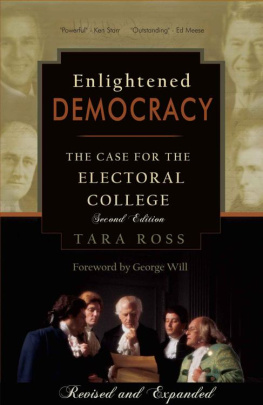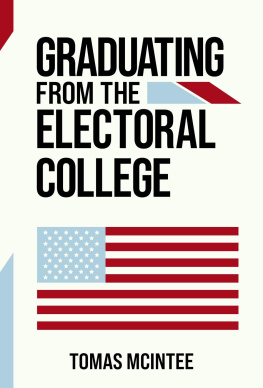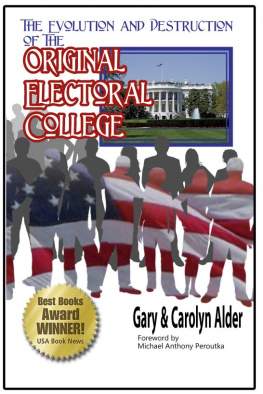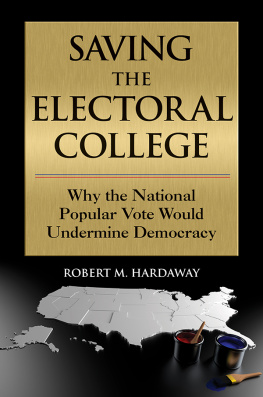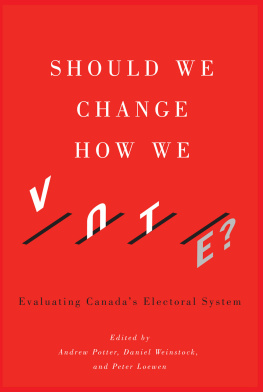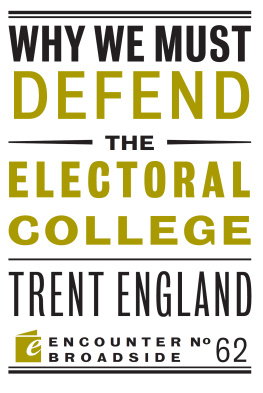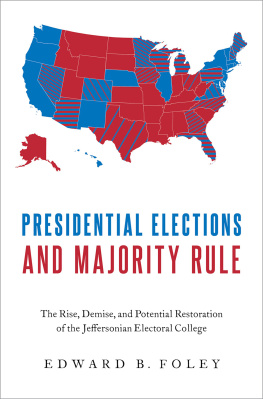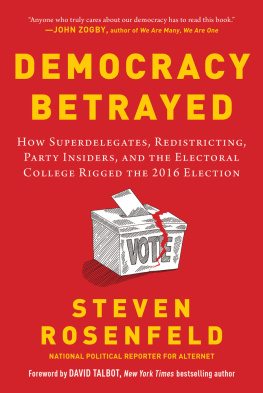E nlightened D emocracy
The Case for the Electoral College
Second Edition
TARA ROSS
Foreword by George Will

Colonial Press, L.P.
8409 Pickwick Ln., No. 280
Dallas, Texas 75225
Copyright 2004, 2012 by Tara Ross.
Foreword copyright 2004, 2012 by George Will.
All rights reserved. First edition 2004.
Second edition 2012.
No part of this book may be reproduced in any form or by any means, electronic, mechanical, photocopying, scanning, or otherwise, without permi s sion in writing from the publisher, except by a reviewer who may quote brief passages in a review.
The first edition of this book was published by World Ahead Publishing, Inc., Los Angeles, CA (hardcover: 2004) and Colonial Press, L.P. (paperback: 2005).
Second Edition
ISBN: 978-0977072224
LCCN: 2012911550
Printed in the United States of America
For my dear husband, Adam,
our sweet daughter, Emma,
and our newest little guy, Grant,
with much love.
Contents
: Mr. George F. Will
Part One: The Origins of the Electoral College
: An American Balancing Act
: The Great Co m promise
: The Constitutions Election Process
Part Two: An 18th-Century Solution for the 21st Century
: A Rapidly Changing Society
: The Benefits of Federalism
: Moderation and Compromise
: Stability and Certainty in Elections
Part Three: Refuting Remaining Criticisms
: The Faithless Elector Problem
: The Contingent Election
: Concerns About Legitimacy
: Alternative Proposals
Part Four: The National Popular Vote Plan
: NPVs Attack on the Electoral College
: Logistical Problems with NPV
: Legal Problems with NPV
Part Five: The Electoral College in Action
: Successful Results Over the Years
: Harrison & Bush: Narrow Vict o ries
: Roosevelt & Reagan: Landslide Victories
: Selected Constitutional Prov i sions
: Election Results: 1789-2008
Foreword
Mr. George F. Will
Americas constitutional system aims not merely for majority rule but for rule by certain kinds of majorities. It aims for majorities suited to moderate, consensual governance of a heterogeneous, continental nation with myriad regional and other diversities. All 537 persons elected to national officesthe president, vice president, 100 senators and 435 representativesare chosen by majorities that reflect the nations federal nature. They are elected by majorities within states or within states congressional districts.
American majorities are not spontaneous; they are built. A two-party system builds moderate majorities by assembling them from coalitions of minorities. In multiparty systems, parties proliferate, each representing intense minorities. Then a group of parties strives to govern through (often unstable) coalitions improvised after the election.
A two-party system is buttressed by an electoral system that handicaps minor parties by electing a single person from each jurisdiction, chosen by majority or plurality. In presidential elections, states are the jurisdictions. Forty-eight of them have chosen a winner-take-all allocation of electoral votes: The presidential candidate winning the state is awarded its entire slate of electors. So in 1992 Ross Perot won 18.9 percent of the popular vote but carried no state and won no electoral votes. Bill Clintons 43 percent of the popular vote won him 68.8 percent of the electoral votes. In 1912 Woodrow Wilsons 41.8 percent of the popular votes produced a strong presidency based on 81.9 percent of the electoral votes.
Political scientist Judith Best notes that the electoral-vote system, combined with winner-take-all allocation, creates a distribution condition. Candidates cannot just pile up popular votes in the most populous states. They must win many states, because legitimacy, and the capacity to govern this extensive republic, involves more than crude arithmetic. The federal principle, Best argues, prevents the most dangerous kinds of factionsracial, religious, economicfrom uniting their votes across state lines. It confines them within little republics and forces them to compromise early and often with their fellow state citizens.
The 2000 election, the sixth in which the popular-vote margin between the winner and runner-up was less than 1 percent, was a reminder that the electoral-vote system quarantines electoral disputes. Imagine a close election2000, or the 1960 election, in which Kennedys margin over Nixon was just 118,574under direct popular election. With all votes poured into a single national bucket, there would be powerful incentives to challenge the results in many thousands of the nations 170,000 precincts. The outcome could remain murky for months, leaving whoever wins crippled by attenuated legitimacy.
America has direct popular election of presidents, but has it within the states. As Best says, the states are not mere administrative agencies for a unitary government; they are components of a compounda federal-republic. And todays electoral-vote system is not an 18th-century anachronism. It has evolved, shaping and being shaped by a large development the Constitutions Framers did not foreseethe two-party system.
Tara Ross book, Enlightened Democracy: The Case for the Electoral College , celebrates this important bulwark of Americas federalist republic. The Constitution provides for the election of Presidents by states electoral votes, rather than individual popular votes, for an important reason: It enables citizens of a heterogeneous, free society to live peacefully alongside each other.
Proposals have recently been made that would undermine the protections provided by Americas unique presidential election system. In 2004, when the first edition of Enlightened Democracy was released, some Coloradans sought to do away with the winner-take-all allocation of their states electoral votes, replacing it with a proportional division. In 2011, Pennsylvania considered legislation ending the states practiceshared by 47 other statesof allocating all of its electoral votes to the candidate who wins the statewide popular vote. It would have joined Maine and Nebraska in allocating one vote to the winner in each congressional district, with the two remaining votes going to the statewide popular vote winner. Today, eight states and the District of Columbia, with 132 electoral votes, are pursuing an even worse idea than Colorados or Pennsylvanias. They have agreed to a compact requiring their electoral votes to be cast for the national popular vote winner, even if he loses their popular vote contests. This compact would come into effect when the states agreeing to it have a decisive 270 votes.
Deep-blue California supports the compact. But if it had existed in 2004, the states electoral votes would have gone to George Bush even though 1.2 million more Californians favored John Kerry.
Supporters of the compact say they favor direct popular election of presidents. But that existswithin each state. The Framers, not being simple, did not subordinate all values to simple majority rule. The electoral vote system shapes the character of presidential majorities, making it unlikely they will be geographically or ideologically narrow.
Todays electoral vote system provides incentives for parties to alter the attributes that make them uncompetitive in important states. It shapes the nations regime and hence the national character. The Electoral College today functions differently than the Founders envisionedthey did not anticipate political partiesbut it does buttress the values encouraged by the federalism the Framers favored, which Coloradans, Pennsylvanians, and all other Americans, should respect.
Next page
